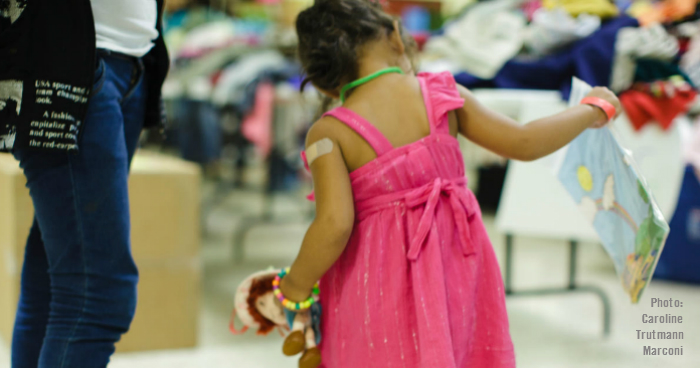 Three year-old migrant girl from Honduras holding a doll and a coloring book. Credit: Caroline Trutmann Marconi/Save the Children
Three year-old migrant girl from Honduras holding a doll and a coloring book. Credit: Caroline Trutmann Marconi/Save the Children
I am the parent of an internationally adopted child. She became part of our family when she was 11 days old, and we left the country of her birth to return to the U.S. when she was 18 months old. It wasn’t easy to get the necessary papers to bring her into the U.S. But it was possible. I cannot imagine not having my daughter. I cannot imagine her being separated from us as a child. Therefore, I cannot imagine what the parents whose children have been recently separated from them at the U.S. border must be going through. Along with most of the world, I am dismayed at this cruelty. How are these parents coping with what must be incomprehensible and frightening for them? And what about the children?
We know from extensive research that toxic stress can alter the development of a young child’s brain—permanent changes that can lead to learning problems, emotional problems and lifelong dysfunction. Toxic stress occurs when a child’s stress response is activated frequently or for a prolonged amount of time and they either lack the ability to end the stressful experience or don’t have a supportive adult to help them through it. We also know that healthy brain development for children requires the presence of a safe, stable and responsive caregiver, regardless of their place of birth, citizenship status or whether the caregiver is biological or adoptive.
What kind of stress are these young children – including some babies – experiencing when they are suddenly taken away from their primary caregiver, placed in an unknown environment, and often cared for by people speaking a language they might not understand? Furthermore, what kind of damage are we doing if we take away the best buffer against toxic stress, their primary caregiver? The Administration’s “zero tolerance policy” brought these circumstances into the lives of thousands of children and now we’re seeing how that damage cannot be easily undone simply by returning children to their parents.
Numerous researchers, doctors and mental health professionals have highlighted the negative impact of this policy on children. Journalists are sharing story after story about the ongoing impact that this separation has on children and families. As just one of many mothers and fathers throughout the world who love their children dearly, I cannot imagine the agony the parents have experienced and will continue to experience even after they have been reunited with their children.
We need to reunite these children and parents immediately and never repeat this travesty. Never.